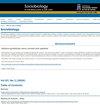Ants (Hymenoptera: Formicidae) increase predation of Belenois solilucis (Lepidoptera: Pieridae) eggs in organic agriculture production systems: a multiple-site field study at Rashad, Sudan
IF 0.6
4区 农林科学
Q4 ENTOMOLOGY
引用次数: 2
Abstract
Organic farming is becoming more popular as there is a greater demand for pesticide-free food. Pest control in organic agricultural production requires a set of skills, including the identification of effective predators and land-use practices. Predation by selected Coleopteran, Dipteran, and Hemipteran insects and Araneae is well established, whereas the predatory role of ants (Hymenoptera: Formicidae) has received little attention in the Rashad district, Sudan. This study was carried out to assess the predation rates of Belenois solilucis eggs and the impact of the land use type around the properties on these rates. An experimente involving predation tests on Belenois solilucis eggs and fauna sampling were conducted in 18 areas of organic agriculture in the Rashad district. The study showed that ants can reduce the eggs population by 26.8% per day. At the same time, other predator taxa, primarily Coleoptera, from Coccinellidae and Staphylinidae families, removed only 13% of the eggs. Ant species with the most significant recruiting power were Axinidris acholli, Tapinoma carininotum, and Technomyrmex moerens. Ant genera such as Linepithema, Dorymyrmex, and Camponotus ants were also frequently observed. The proportion of the planted area within a 500-meter radius, in addition to the interaction of other landscape categories, had a minor influence on predation, but only when the predators were not ants. The landscape does not affect predation by predators in general, including ants, or on ant predation in particular.在苏丹拉沙德,有机农业生产系统中蚂蚁(膜翅目:蚁科)增加了对Belenois solilucis(鳞翅目:蚁科)卵的捕食
随着对无农药食品的需求越来越大,有机农业越来越受欢迎。有机农业生产中的害虫控制需要一套技能,包括识别有效的捕食者和土地利用做法。选定的鞘翅目、双翅目和半翅目昆虫以及蜘蛛目的捕食行为已经确立,而蚂蚁(膜翅目:蚁科)的捕食作用在苏丹拉沙德地区几乎没有受到关注。进行这项研究是为了评估单卵蓝蛋白的捕食率,以及这些特性周围的土地利用类型对这些捕食率的影响。在Rashad区的18个有机农业区进行了一项实验,包括对单核贝卵的捕食试验和动物取样。研究表明,蚂蚁每天可以减少26.8%的产卵量。与此同时,其他捕食者分类群,主要是来自球虫科和葡萄门科的鞘翅目,只去除了13%的卵。具有最显著招募能力的蚂蚁物种是无孔Axinidris acholli、卡氏Tapinoma carininotum和Technomermex moerens。蚂蚁属如Linepithema、Dorymyrmex和Camponotus蚂蚁也经常被观察到。500米半径内的种植面积比例,以及其他景观类别的相互作用,对捕食影响较小,但仅当捕食者不是蚂蚁时。景观不会影响包括蚂蚁在内的捕食者的捕食,尤其不会影响蚂蚁的捕食。
本文章由计算机程序翻译,如有差异,请以英文原文为准。
求助全文
约1分钟内获得全文
求助全文
来源期刊

Sociobiology
生物-昆虫学
CiteScore
1.60
自引率
11.10%
发文量
28
审稿时长
3 months
期刊介绍:
SOCIOBIOLOGY publishes high quality articles that significantly contribute to the knowledge of Entomology, with emphasis on social insects. Articles previously submitted to other journals are not accepted. SOCIOBIOLOGY publishes original research papers and invited review articles on all aspects related to the biology, evolution and systematics of social and pre-social insects (Ants, Termites, Bees and Wasps). The journal is currently expanding its scope to incorporate the publication of articles dealing with other arthropods that exhibit sociality. Articles may cover a range of subjects such as ecology, ethology, morphology, population genetics, physiology, toxicology, reproduction, sociobiology, caste differentiation as well as economic impact and pest management.
 求助内容:
求助内容: 应助结果提醒方式:
应助结果提醒方式:


